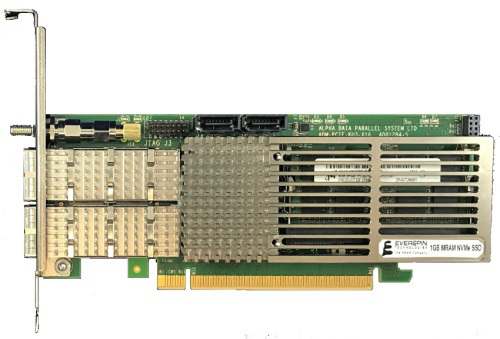Everspin's nvNITRO targets evolving MRAM marke
Initial nvNITRO accelerators will be available in capacities of a 1GB and 2GB, based on Everspin’s 256Mb DDR3 ST-MRAM.

Figure 1: Everspin's nvNITRO storage accelerator boasts performance of 1.5 million IOPS with 6 microsecond end-to-end latency. (Source: Everspin)
MRAM chip supplier Everspin Technologies has rolled out its first system-level product line, partly as a way to seed the still-developing market for higher density MRAM devices based on spin-transfer-torque (ST) technology.
The Chandler, Arizona-based company introduced a family of storage accelerators, nvNITRO, said to harness the power of ST-MRAM to deliver extremely fast read and write times with ultra-low latency. The company said initial nvNITRO accelerators will be available in capacities of a 1GB and 2GB, based on Everspin’s 256Mb DDR3 ST-MRAM. Additional capacities from 4GB up to 16GB are expected to be available later in this year using Everspin’s forthcoming 1Gb DDR4 ST-MRAM.
“It’s definitely a new avenue for us to get the technology into the marketplace in a different way,” said Joe O’Hare, Everspin’s director of product marketing, in an interview with EE Times. “That doesn’t mean that we are backing off at all on supplying memory chips to the market. That’s still our primary business.”
Everspin remains the only company to have shipped a commercial MRAM product. Everspin began shipping MRAM in 2006 when it was still part of Freescale and now claims to have shipped more than 60 million MRAM devices.
But Everspin’s first-generation of MRAM technology—the vast majority of the products it has shipped thus far—is based on toggle-mode MRAM technology, which ultimately would not scale much beyond the 16 Mb density that makes up the bulk of Everspin’s shipments. The company’s second- and third-generations of MRAM have been of the ST-MRAM variety, with the most recently utilising perpendicular magnetic tunnel junction (pMTJ) spin-torque technology. Last August, Everspin became the first company to announce sampling of pMTJ based ST-MRAM, which is believed to be the MRAM technology that offers the best scalability, shape dependence and magnetic scalability.

Figure 1: Everspin's nvNITRO storage accelerator boasts performance of 1.5 million IOPS with 6 microsecond end-to-end latency. (Source: Everspin)
MRAM, or magneto-resistive random access memory, has been in development since the 1990s. Based on the same magnetics technology used in the hard disk drive industry since the 90s, it is one of a group of several emerging technologies that have been considered candidates for next-generation memory to replace the semiconductor industry’s stalwarts such as DRAM and NAND flash, which are facing serious scaling challenges as the industry moves to smaller nodes.
Over the years, a large number of companies have been involved in MRAM development to one degree or another, including semiconductor heavyweights such as IBM, Intel and Samsung. Currently, there are also a handful of start-ups developing pMTJ ST-MRAM, including Avalanche Technology and Spin Transfer Technologies, which announced that it was sampling pMTJ ST-MRAM devices earlier this year.
CONTACT US
USA
Vilsion Technology Inc.
36S 18th AVE Suite A,Brington,Colorado 80601,
United States
E-mail:sales@vilsion.com
Europe
Memeler Strasse 30 Haan,D 42781Germany
E-mail:sales@vilsion.com
Middle Eastern
Zarchin 10St.Raanana,43662 Israel
Zarchin 10St.Raanana,43662 Israel
E-mail:peter@vilsion.com
African
65 Oude Kaap, Estates Cnr, Elm & Poplar Streets
Dowerglen,1609 South Africa
E-mail:amy@vilsion.com
Asian
583 Orchard Road, #19-01 Forum,Singapore,
238884 Singapore
238884 Singapore
E-mail:steven@vilsion.com
